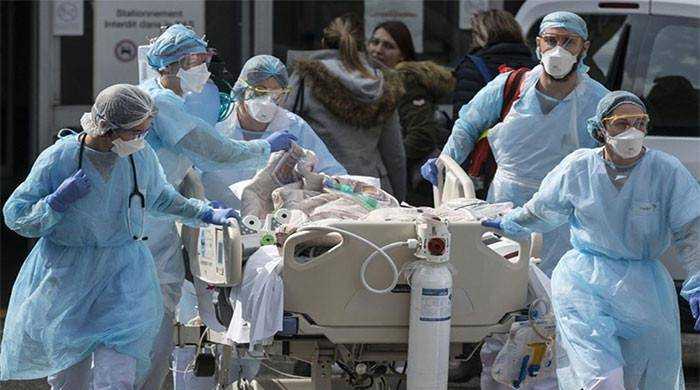The Swiss give more than 300 million dollars to fight against the coronavirus; Kiev to ease restrictions as Covid cases decline
[ad_1]
KIEV: The mayor of the Ukrainian capital Kiev on Wednesday announced that strict coronavirus measures in the city would be relaxed later this week as the number of new infections slowly declined.
Former Soviet Ukraine had recently been hit by a spike in new cases and deaths, including in Kiev, prompting authorities to tighten sweeping measures to curb the spread of the virus, including shutting down schools and shopping malls.
They are expected to reopen on Saturday alongside cinemas, gymnasiums and public transport, which had been limited to the exclusive use of essential workers, Kyiv Mayor Vitali Klitschko said. Schools should reopen next Wednesday, added the mayor, after the holidays earlier in the week. The remaining restrictions, such as maintaining social distancing and masks in public, will be relaxed “gradually,” Klitschko said.
“The infection rate in Kiev has declined slightly, but it is too early to say that we have overcome the challenges,†he said in an online briefing. Authorities in the capital were reluctant to reimpose restrictions when cases rose for fear of harming the economy of one of Europe’s poorest countries.
The measures came into effect gradually, with cinemas and cafes closed in March and schools and public transport closed earlier in April. “I understand that everyone wants to get back to normal life. I understand that business is suffering. But the main thing today is to preserve people’s lives and health,” said the mayor.
Officials in Kiev, a city of about three million people, on Wednesday recorded 1,070 new cases and 40 deaths. These new figures show a downward trend in fresh infections from 1,673 new cases on April 22 and 1886 on April 8.
Ukraine, with a population of around 40 million, struggled during the pandemic. It recorded 9,590 new cases and 441 deaths on Wednesday. In total, there have been over 2 million infections and over 43,000 deaths. A vaccination campaign was launched at the end of February and some 560,000 people have so far received a first vaccine.
At the same time, Switzerland said on Wednesday it would provide more than $ 300 million to help improve access to jabs, tests and treatment in the fight against Covid-19, and to ensure that countries in development get their fair share.
The Swiss government has expressed its commitment “to ensure equitable access to vaccines, tests and drugs throughout the world in order to fight sustainably against the Covid-19 pandemic”. In a statement, Bern announced plans to donate around 300 million Swiss francs ($ 328 million, € 272 million) to the Covid Tools Access Accelerator (ACT).
On a related note, Paris prosecutors are undertaking and combining in a manslaughter investigation three separate inquiries into the deaths of three people who received the AstraZeneca Covid-19 vaccine in France, they said on Wednesday. .
Prosecutors specializing in the conduct of complex investigations into health products will take charge of the preliminary investigations already opened after the filing of complaints in Toulouse, Paris and Nantes. The first investigations were carried out by regional prosecutors. According to the Paris prosecutor’s office, the plaintiffs wonder if there was a causal role of the Astrazeneca vaccine in the death of their loved ones.
“We first approached local prosecutors for the sake of speed and to carry out autopsies, then we asked them to transfer the case to Paris,” Etienne Boittin, the lawyer responsible for complaints, told AFP. In Nantes, a 26-year-old medical student died suddenly of a blood clot on March 18 just days after being vaccinated with the AstraZeneca vaccine. The Toulouse case concerns a 38-year-old social worker who also died of a blood clot after her health deteriorated sharply after receiving the vaccine.
Boittin said he was treating fifteen cases of people who died in France after being vaccinated with AstraZeneca, the vast majority of them “under the age of 60”. France’s national health authority HAS said last month that the AstraZeneca vaccine should only be given to people aged 55 and over due to reports of potentially fatal blood clots in a very small number of young people vaccinated.
This move is broadly similar to measures taken by several European countries, although Denmark has banned the use of the vaccine outright. Authorities also said those under 55 who received a first injection of the AstraZeneca Covid-19 vaccine should receive a second vaccine from another producer.


[ad_2]

